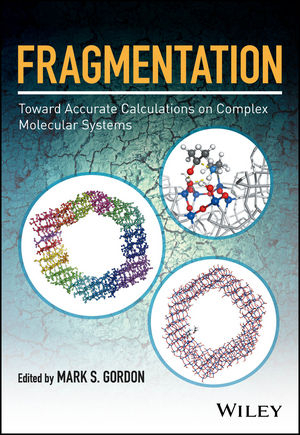
Fragmentation: Toward Accurate Calculations on Complex Molecular Systems
John Wiley & Sons Inc (Verlag)
978-1-119-12924-0 (ISBN)
- Titel z.Zt. nicht lieferbar
- Versandkostenfrei innerhalb Deutschlands
- Auch auf Rechnung
- Verfügbarkeit in der Filiale vor Ort prüfen
- Artikel merken
Topics covered include:
Fragmentation methods
Embedding methods
Explicitly correlated local electron correlation methods
Fragment molecular orbital method
Methods for treating large molecules
This book is aimed at academic researchers who are interested in computational chemistry, computational biology, computational materials science and related fields, as well as graduate students in these fields.
Edited by MARK S. GORDON, Department of Chemistry, Iowa State University, Ames, USA
List of Contributors xi
Preface xv
1 Explicitly Correlated Local Electron Correlation Methods 1
Hans-Joachim Werner, Christoph Koppl, Qianli Ma, and Max Schwilk
1.1 Introduction 1
1.2 Benchmark Systems 3
1.3 Orbital-Invariant MP2 Theory 6
1.4 Principles of Local Correlation 9
1.5 Orbital Localization 10
1.6 Local Virtual Orbitals 12
1.7 Choice of Domains 24
1.8 Approximations for Distant Pairs 26
1.9 Local Coupled-Cluster Methods (LCCSD) 33
1.10 Triple Excitations 41
1.11 Local Explicitly Correlated Methods 41
1.12 Technical Aspects 53
1.13 Comparison of Local Correlation and Fragment Methods 57
1.14 Summary 60
Appendix A: The LCCSD Equations 63
Appendix B: Derivation of the Interaction Matrices 65
References 67
2 Density and Potential Functional Embedding: Theory and Practice 81
Kuang Yu, Caroline M. Krauter, Johannes M. Dieterich, and Emily A. Carter
2.1 Introduction 81
2.2 Theoretical Background 82
2.3 Density Functional Embedding Theory 84
2.4 Potential Functional Embedding Theory 101
2.5 Summary and Outlook 109
Acknowledgments 111
References 111
3 Modeling and Visualization for the Fragment Molecular Orbital Method with the Graphical User Interface FU, and Analyses of Protein–Ligand Binding 119
Dmitri G. Fedorov and Kazuo Kitaura
3.1 Introduction 119
3.2 Overview of FMO 120
3.3 Methodology 120
3.4 GUI Development 128
3.5 Conclusions 136 Acknowledgments 137 References 137
4 Molecules-in-Molecules Fragment-Based Method for the Accurate Evaluation of Vibrational and Chiroptical Spectra for Large Molecules 141
K. V. Jovan Jose and Krishnan Raghavachari
4.1 Introduction 141
4.2 Computational Methods and Theory 142
4.3 Results and Discussion 146
4.4 Summary 157
4.5 Conclusions 158 Acknowledgments 159 References 159
5 Effective Fragment Molecular Orbital Method 165
Casper Steinmann and Jan H. Jensen
5.1 Introduction 165
5.2 Effective Fragment Molecular Orbital Method 168
5.3 Summary and Future Developments 180
References 180
6 Effective Fragment Potential Method: Past, Present, and Future 183
Lyudmila V. Slipchenko and Pradeep K. Gurunathan
6.1 Overview of the EFP Method 183
6.2 Milestones in the Development of the EFP Method 185
6.3 Present: Chemistry at Interfaces and Photobiology 192
6.4 Future Directions and Outlook 202
References 203
7 Nucleation Using the Effective Fragment Potential and Two-Level Parallelism 209
Ajitha Devarajan, Alexander Gaenko, Mark S. Gordon, and Theresa L. Windus
7.1 Introduction 209
7.2 Methods 211
7.3 Results 217
7.4 Conclusions 223
Acknowledgments 223
References 224
8 Five Years of Density Matrix Embedding Theory 227
Sebastian Wouters, Carlos A. Jime´nez-Hoyos, and Garnet K.L. Chan
8.1 Quantum Entanglement 227
8.2 Density Matrix Embedding Theory 228
8.3 Bath Orbitals from a Slater Determinant 230
8.4 The Embedding Hamiltonian 232
8.5 Self-Consistency 234
8.6 Green’s Functions 236
8.7 Overview of the Literature 237
8.8 The One-Band Hubbard Model on the Square Lattice 237
8.9 Dissociation of a Linear Hydrogen Chain 240
8.10 Summary 240
Acknowledgments 241
References 241
9 Ab initio Ice, Dry Ice, and Liquid Water 245
So Hirata, Kandis Gilliard, Xiao He, Murat Kec¸eli, Jinjin Li, Michael A. Salim, Olaseni Sode, and Kiyoshi Yagi
9.1 Introduction 245
9.2 Computational Method 247
9.3 Case Studies 256
9.4 Concluding Remarks 284
9.5 Disclaimer 284 Acknowledgments 284 References 285
10 A Linear-Scaling Divide-and-Conquer Quantum Chemical Method for Open-Shell Systems and Excited States 297
Takeshi Yoshikawa and Hiromi Nakai
10.1 Introduction 297
10.2 Theories for the Divide-and-Conquer Method 298
10.3 Assessment of the Divide-and-Conquer Method 307
10.4 Conclusion 318
References 319
11 MFCC-Based Fragmentation Methods for Biomolecules 323
Jinfeng Liu, Tong Zhu, Xiao He, and John Z. H. Zhang
11.1 Introduction 323
11.2 Theory and Applications 324
11.3 Conclusion 345 Acknowledgments 346 References 346
Index 349
| Erscheinungsdatum | 10.10.2017 |
|---|---|
| Verlagsort | New York |
| Sprache | englisch |
| Maße | 175 x 246 mm |
| Gewicht | 885 g |
| Themenwelt | Mathematik / Informatik ► Informatik ► Theorie / Studium |
| Naturwissenschaften ► Biologie | |
| Naturwissenschaften ► Chemie ► Organische Chemie | |
| Naturwissenschaften ► Chemie ► Physikalische Chemie | |
| Technik ► Maschinenbau | |
| ISBN-10 | 1-119-12924-9 / 1119129249 |
| ISBN-13 | 978-1-119-12924-0 / 9781119129240 |
| Zustand | Neuware |
| Informationen gemäß Produktsicherheitsverordnung (GPSR) | |
| Haben Sie eine Frage zum Produkt? |
aus dem Bereich


